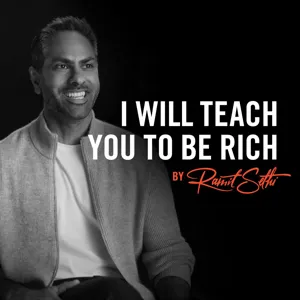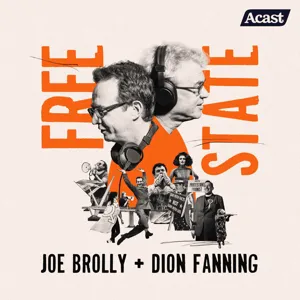Podcast Summary
Navigating conflict for effective social change: Acknowledging and embracing disagreement and difficult conversations in movements can lead to more effective social change.
Learning from this conversation with Sarah Schulman is the importance of acknowledging and navigating conflict in creating social change. Before the era of effective AIDS treatments, the disease was stigmatized and those affected faced immense discrimination and abandonment. Sarah's book, "Let the Record Show," about ACT UP New York, emphasizes the need for movements to embrace disagreement and difficult conversations instead of striving for consensus. This approach, as Sarah argues, can lead to more effective social change. The discussion also touched upon the themes of Schulman's earlier book, "Conflict is Not Abuse," which explores the complexities of power dynamics and communication in conflict resolution. The conversation veered into the topic of Israel-Palestine, highlighting the relevance of these ideas in addressing larger, contentious issues.
Early AIDS crisis response marked by neglect, ACT UP emerges as groundbreaking activist group: ACT UP, founded in 1987, brought attention and action to the AIDS crisis, advocating for increased research funding, access to treatments, and greater public awareness, while revealing societal issues of neglect towards marginalized communities.
The early response to the AIDS crisis in the late 1980s was marked by a lack of political action and representation for the affected communities. The crisis was largely ignored by the media and the government, and those most affected were primarily gay men, women, people of color, poor people, Haitians, hemophiliacs, and people born HIV positive. ACT UP, founded in 1987, was a groundbreaking political organization that aimed to bring attention and action to the crisis. Precursors to ACT UP included public demonstrations against the Supreme Court's upholding of sodomy laws and disruptions of business-as-usual events. In its first six years, ACT UP achieved remarkable success, pushing for increased research funding, access to treatments, and greater public awareness of the crisis. The group's activism revealed the deeper societal issues that the AIDS crisis brought to light, including lack of understanding and acceptance of marginalized communities.
ACT UP's Impact on HIV/AIDS Research and Society: ACT UP, an AIDS activist group, shifted pharmaceutical focus, advocated for access to experimental drugs, changed CDC's definition of AIDS, made needle exchange legal, and started housing and support organizations, revolutionizing societal acceptance of HIV/AIDS issues.
ACT UP, an AIDS activist group founded in 1987, brought about significant changes in the way HIV/AIDS was researched, treated, and perceived in society. They forced pharmaceutical companies to shift their focus from finding a single cure to addressing opportunistic infections. ACT UP also advocated for access to experimental drugs, changed the CDC's definition of AIDS, made needle exchange legal, and started organizations for housing and support for people with AIDS. The journalist's involvement began in the early 1980s when she covered AIDS stories for underground newspapers, and she joined ACT UP in 1987. While acknowledging the success of other movements like gay marriage and Black Lives Matter, ACT UP stands out for its impact on societal acceptance of previously marginalized issues. Its disruptive tactics made the public more receptive to once-radical ideas. The exact number of ACT UP members is unknown, but its influence was undeniable.
Small groups can make a big impact: ACT UP, a vanguard AIDS activist group, demonstrated the power of committed, patient-centered groups through effective actions and solutions, studying institutions, learning policies, and engaging in civil disobedience when necessary.
Small, committed groups of people can have a significant impact on society. ACT UP, a vanguard movement against AIDS, demonstrates this with its effective actions and patient-centered solutions. Members, who were mostly people living with AIDS, determined the agenda and designed winnable, reasonable, and doable solutions. They studied institutions, learned about policies, and presented their solutions to those in power. When met with resistance, they engaged in nonviolent civil disobedience to attract media attention and pressure for change. ACT UP's success lies in its patient-centered approach and its refusal to accept a passive role. Some effective campaigns include Larry Kramer's meeting with a pharmaceutical company head and the "Silence = Death" campaign. ACT UP's strategies varied based on social position, and contemporary movements can learn from its pioneering patient-centered solutions and activist tactics.
Diverse and experimental approach to activism: ACT UP's radical democracy and lack of consensus allowed for a range of actions, addressing unique needs and bringing significant change in the AIDS crisis
ACT UP's effectiveness came from its diverse and experimental approach to activism. ACT UP was not a traditional, hierarchical organization, but rather a "big tent" that welcomed various tactics and perspectives to achieve its goal of ending the AIDS crisis. The organization's radical democracy and lack of demand for consensus allowed for a range of actions, from peaceful protests to civil disobedience. This approach allowed ACT UP to address the unique needs and situations of different communities affected by AIDS, such as women and IV drug users. By fostering a culture of experimentation and allowing for diverse tactics, ACT UP was able to bring about significant change, including changing the CDC definition of AIDS and making needle exchange legal in New York.
Embracing Direct Action for Social Change: ACT UP used disruptive protests to challenge power structures and bring attention to the AIDS crisis, emphasizing the importance of conflict and open dialogue for social change.
ACT UP, an influential activist group in the fight against AIDS, embraced direct action as a means to challenge power structures and bring attention to their cause. This approach, inspired by civil rights movements, involved identifying community needs, designing solutions, presenting them to those in power, and engaging in self-purification when responses were unsatisfactory. ACT UP's bold actions, such as disrupting mass at Saint Patrick's Cathedral or occupying Grand Central Station, were aimed at inserting marginalized voices into the power apparatus and forcing recognition of their issues. The group's acceptance of conflict as a necessary part of activism is a theme that resonates with the author's other work, "Conflict is Not Abuse." Both works emphasize the importance of embracing conflict and fostering a culture of open dialogue for meaningful change.
Understanding the Complexity of Conflict: Conflict isn't always abusive and natural responses to challenging situations should be recognized, not suppressed.
People who resist injustice and challenge the status quo are often labeled as the perpetrators or the source of conflict, while the real perpetrators position themselves as victims. This dynamic is not limited to political activism but can be seen in various aspects of life, including family relationships and societal issues. The discomfort caused by these challenges is necessary for societal growth, but those in dominant positions often insist on comfort, leading to suppression of differences. The books discussed highlight the importance of recognizing that conflict is not always abusive, and people who have experienced trauma can also feel threatened by difference. It's crucial to understand that these feelings are not always a result of abuse but rather a natural response to challenging situations. Conflict Is Not Abuse primarily focused on the Israeli occupation of Palestine, but its messages resonated with younger audiences experiencing an overaccusatory subculture. Ultimately, the books remind us that those fighting against oppression are not the aggressors, but rather the responders.
Exploring the complexities of conflict and communication: Understanding past traumas and deeply rooted fears are crucial for resolving conflicts and fostering healthy dialogue.
That the book "Conflict is Not Abuse" by Sarah Schulman explores the importance of communication in resolving conflicts and the dangers of shutting down dialogue. The author uses personal experiences and builds towards larger societal issues, including loyalty and conflict in the context of Israel-Palestine and domestic violence. The book emphasizes the need to address unresolved past traumas and prevent projecting them onto the present, as well as the importance of understanding that conflicts often arise from deeply rooted fears and anxieties. The conversation also touched upon the author's upbringing in a Jewish context and the role of familial loyalty in shaping political beliefs. Overall, the book is a profound exploration of the complexities of conflict and communication, and the importance of acknowledging and addressing past traumas to foster healthy relationships and dialogue.
Israel-Palestine Conflict: A Toxic Dynamic Fueled by Fears and Perceived Vulnerabilities: The Israel-Palestine conflict risks becoming unstable and explosive due to deep-rooted fears, perceived vulnerabilities, and a lack of constructive dialogue. The world must intervene to prevent further violence and find a peaceful resolution, as military force cannot solve the root causes.
The persisting conflict between Israel and Palestine is a dangerous and toxic dynamic fueled by deep-rooted fears and perceived vulnerabilities on both sides. The gap between how each side perceives itself and how it is perceived by the world is a significant vulnerability that risks further escalation. The response to oppression, such as rocket attacks, is often the focus, while the root causes are overlooked. Communication and resolution are not being pursued, and the situation risks becoming unstable and potentially explosive. As Americans, we have a responsibility to intervene and end the funding of the Israeli war machine, as global support for change grows. The conflict cannot be solved with military force, and a constructive dialogue is necessary to find a just and equitable solution. The use of the term "apartheid" to describe the situation is debated, but there is agreement that people should not have different rights based on their religion. The world must intervene to prevent further violence and find a peaceful resolution.
Acknowledging voices in conflicts and power shifts: Power disparities can hinder communication and require a shift in power dynamics for meaningful dialogue. Reclaiming symbols can turn negative experiences into positive expressions of identity.
Meaningful communication and resolution in conflicts, especially those with significant power imbalances, requires acknowledging the value and voices of all parties involved. This was a recurring theme in the discussion about the Israeli-Palestinian conflict and the role of media in presenting it. Power disparities can hinder communication and may require a shift in power dynamics before genuine dialogue can occur. The speaker also shared personal experiences of being silenced and the importance of allowing all voices to be heard in order to find solutions that address everyone's needs. The pink triangle, a symbol of AIDS activism, was another topic discussed. Originally a symbol of persecution, it was reclaimed and turned into a symbol of identity, showcasing the power of reclaiming symbols and turning negative experiences into positive expressions of identity.
The importance of community and collective action in queer politics: Queer politics have become more mainstream, but there's a risk of losing focus on progressive change and collective action. It's crucial to consider the impact of individual actions and revisit the queer critique of American culture for inspiration.
The value of community identification and collective action, which was instrumental during the AIDS crisis, has been somewhat lost in the past few decades. Abram Finkelstein, who was part of the Silence equals Death project, came from a background where the Holocaust and the idea of bystanders not intervening was a powerful motivator. Today, queer politics and identities have become more mainstream and aspirational, but there's a risk of losing the collective spirit and focus on progressive change. The market-oriented culture we live in can lead to lifestyleism without substance. It's essential for individuals to consider their actions' impact on progressive change and not just adopt identities for external validation. The legacy of the queer critique of American culture, which advocated for liberatory relationships and a Utopian dream of a more open and collective world, should be revisited and resuscitated for the current context.
Collective efforts and coalitions lead to societal change: Recognize the power of collective action and diverse perspectives in driving change. Read 'Poor Queer Studies', 'Vanguard', and 'Memorial Drive' for insights into inequality, women's suffrage, and storytelling.
Change in society doesn't come from individuals alone, but rather through collective efforts and coalitions. Author Sarah Schulman emphasizes the importance of practicing radical democracy and creating space for diverse voices to come together. She shares her personal experiences of being an artist and navigating the collective impact of her work. Schulman also highlights the importance of understanding history and challenging myths, as seen in her recommendations of "Poor Queer Studies" by Matt Brim, "Vanguard" by Martha S. Jones, and "Memorial Drive" by Natasha Trethewey. These books offer insights into inequality, women's suffrage, and the power of storytelling, respectively. Overall, Schulman's message encourages us to recognize the importance of collective action and diverse perspectives in driving change.
The importance of a well-produced podcast: Expert producers, fact checkers, original music, and mixers enhance the listener's experience and effectively convey complex ideas
Importance of a well-produced podcast. The Ezra Klein Show, a production of New York Times Opinion, is an excellent example of this. With the expertise of Jeff Geld, Roshay Karma, and Annie Galvin as producers, Michelle Harris as fact checker, Isaac Jones as original music composer, and Jeff Geld as mixer, every episode is polished and engaging. This team ensures that the content is not only informative but also sonically pleasing. Additionally, fact-checking adds credibility to the information being shared. Overall, the production quality enhances the listener's experience and helps to effectively convey complex ideas.






